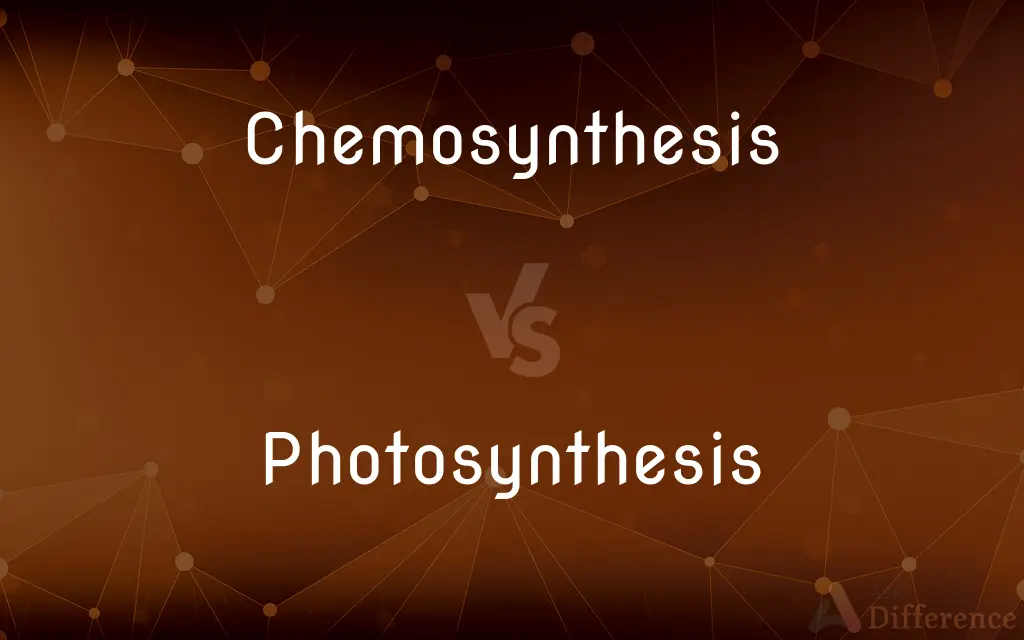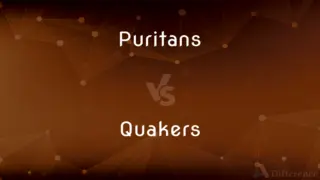Chemosynthesis vs. Photosynthesis — What's the Difference?

Difference Between Chemosynthesis and Photosynthesis
ADVERTISEMENT
Compare with Definitions
Chemosynthesis
In biochemistry, chemosynthesis is the biological conversion of one or more carbon-containing molecules (usually carbon dioxide or methane) and nutrients into organic matter using the oxidation of inorganic compounds (e.g., hydrogen gas, hydrogen sulfide) or ferrous ions as a source of energy, rather than sunlight, as in photosynthesis. Chemoautotrophs, organisms that obtain carbon from carbon dioxide through chemosynthesis, are phylogenetically diverse.
Photosynthesis
Photosynthesis is a process used by plants and other organisms to convert light energy into chemical energy that, through cellular respiration, can later be released to fuel the organism's metabolic activities. This chemical energy is stored in carbohydrate molecules, such as sugars and starches, which are synthesized from carbon dioxide and water – hence the name photosynthesis, from the Greek phōs (φῶς), "light", and sunthesis (σύνθεσις), "putting together".
Chemosynthesis
The synthesis of organic compounds by certain bacteria, especially in deep-sea hydrothermal vents, using energy obtained from the chemical oxidation of simple inorganic compounds. Chemosynthesis is thought to have been used by the first forms of life on Earth.
Photosynthesis
The process in green plants and certain other organisms by which carbohydrates are synthesized from carbon dioxide and a source of hydrogen (usually water), using light as an energy source. Most forms of photosynthesis release oxygen as a byproduct.
Chemosynthesis
The production of carbohydrates and other compounds from simple compounds such as carbon dioxide, using the oxidation of chemical nutrients as a source of energy rather than sunlight; it is limited to certain bacteria and fungi
ADVERTISEMENT
Photosynthesis
(biology) Any process by which plants and other photoautotrophs convert light energy into chemical energy,
Chemosynthesis
Synthesis of organic compounds by energy derived from chemical changes or reactions. Chemosynthesis of carbohydrates occurs in the nitrite bacteria through the oxidation of ammonia to nitrous acid, and in the nitrate bacteria through the conversion of nitrous into nitric acid.
Photosynthesis
Principally, oxygenic photosynthesis, any process by which plants and algae convert water and carbon dioxide into carbohydrates and waste oxygen using solar energy.
Chemosynthesis
Synthesis of carbohydrate from carbon dioxide and water; limited to certain bacteria and fungi
Photosynthesis
Also, non-oxygenic photosynthesis, used by purple and green bacteria, heliobacteria, and acidobacteria.
Photosynthesis
The process of constructive metabolism by which carbohydrates are formed from water vapor and the carbon dioxide of the air in the chlorophyll-containing tissues of plants exposed to the action of light. It was formerly called assimilation, but this is now commonly used as in animal physiology. The details of the process are not yet clearly known. Baeyer's theory is that the carbon dioxide is reduced to carbon monoxide, which, uniting with the hydrogen of the water in the cell, produces formaldehyde, the latter forming various sugars through polymerization. Vines suggests that the carbohydrates are secretion products of the chloroplasts, derived from decomposition of previously formed proteids. The food substances are usually quickly translocated, those that accumulate being changed to starch, which appears in the cells almost simultaneously with the sugars. The chloroplasts perform photosynthesis only in light and within a certain range of temperature, varying according to climate. This is the only way in which a plant is able to organize carbohydrates. All plants without a chlorophyll apparatus, as the fungi, must be parasitic or saprophytic.
Photosynthesis
Synthesis of compounds with the aid of radiant energy (especially in plants)
Share Your Discovery

Previous Comparison
Cerberus vs. Constellation
Next Comparison
Puritans vs. Quakers














































